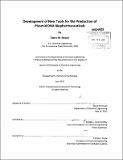Development of new tools for the production of plasmid DNA biopharmaceuticals
Author(s)
Bower, Diana M. (Diana Morgan)
DownloadFull printable version (9.189Mb)
Other Contributors
Massachusetts Institute of Technology. Dept. of Chemical Engineering.
Advisor
Kristala L. Jones Prather.
Terms of use
Metadata
Show full item recordAbstract
DNA vaccines and gene therapies that use plasmid DNA (pDNA) as a vector have gained attention in recent years for their good safety profile, ease of manufacturing, and potential to treat a host of diseases. With this interest comes increased demand for high-yield manufacturing processes. Overall, this thesis aims to develop new, innovative tools for the production of plasmid DNA biopharmaceuticals. As one part of this thesis, we designed a 1-mL fed-batch microbioreactor with online monitoring and control of dissolved oxygen, pH, and temperature, as well as continuous monitoring of cell density. We used the microbioreactors to scale down temperature-induced production of a pUC-based DNA vaccine vector, pVAX1-GFP. Scaled-down processes can facilitate high-thoughtput, low-cost bioprocess development. We found that the microbioreactors accurately reproduced the behavior of a bench-scale bioreactor as long as key process parameters, such as dissolved oxygen, were held constant across scales. The monitoring capabilities of the microbioreactors also provided enhanced process insight and helped identify conditions that favored plasmid amplification. A second aspect of this thesis involved construction and characterization of a new DNA vaccine vector based on a runaway replication mutant of the R1 replicon. Runaway replication plasmids typically show increased amplification after a temperature upshift. However, we found that our new vector, pDMB02-GFP, gave higher yields during constant temperature culture at 30"C, reaching a maximum of 19 mg pDNA/g DCW in shake flasks. We gained mechanistic insight into this behavior by measuring RNA and protein expression levels of RepA, a plasmid-encoded protein required for initiation of replication at the R1 origin. Through these studies we found that RepA levels may limit plasmid amplification at 42*C, and relieved this limitation by increasing RepA translation efficiency via a start codon mutation. We also scaled up production of pDMB02-GFP at 300C from 50-mL shake flasks to 2-L bioreactors. Initial scale up efforts resulted in increased growth rate compared to the shake flasks, accompanied by very low plasmid yields. Decreasing the growth rate by limiting dissolved oxygen increased plasmid specific yield and emerged as a viable strategy for maintaining productivity during scale up.
Description
Thesis (Ph. D.)--Massachusetts Institute of Technology, Dept. of Chemical Engineering, 2012. Cataloged from PDF version of thesis. Includes bibliographical references (p. 96-104).
Date issued
2012Department
Massachusetts Institute of Technology. Department of Chemical EngineeringPublisher
Massachusetts Institute of Technology
Keywords
Chemical Engineering.